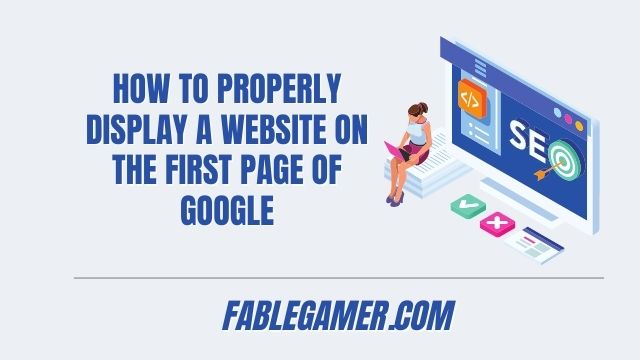Looking for how to display your website on the first page of Google? Well, that’s right, because in this article we have prepared several surefire ways to display a website on Google that you can apply.
The website is indeed a digital media that serves to promote products / services. However, to bring in online customers through the website, the website must be displayed on the first page of Google with relevant keywords.
That way, websites can attract more quality traffic that has the potential to become buying customers. Because a website that is not optimized for search engines and users will not be profitable for your business.
Well therefore, to make your website generate quality leads, you must optimize it correctly. You can apply some of these ways to display your website on the first page of Google.
4 Ways to Display a Website on the First Page of Google
Creating a quality website is the first step to bringing in customers. And the next step is to optimize it so that the people who come to your website are the right people.
Because if your website is visited by people who are not interested in the products/services you offer it will be useless. They will not buy your product/service. So what are the many visitors for but not increasing sales?
Now to bring in people who are right on target, you can do several ways to bring up a website in the following Google search:
1. Make Your Website Professional
One way to display a website on Google is to make your website professional. Both in terms of appearance, navigation, layout to user-friendliness and search engines.
This means that your website must be created with an attractive appearance and a layout that does not make it difficult for visitors. In addition, your website needs to be created with clear and professional navigation making it easier for visitors to find their purpose.
There are many website elements that affect search engine rankings, such as loading speed, mobile friendly, SEO friendly and more.
- Loading Speed
Loading speed is an element that affects search engine rankings. In addition, speed also affects user satisfaction and experience. Because if the website is slow to load, visitor satisfaction is reduced which results in a high bounce rate.
After all, search engines like Google prefer fast websites compared to websites that are long in loading. Because Google is a search engine that will always increase the satisfaction of its users. That’s why Google will show websites that are fast in loading.
- Mobile Friendly
In this modern era, smartphone users can easily access the internet. Users of mobile devices can search for various information through search engines. And that means your website needs to be made mobile friendly.
One of the things that makes Google rank higher is the mobile friendly design. Because many users are using mobile devices to connect with this biggest search engine. Then Google will present a website that is indeed mobile-friendly.
- SEO Friendly
Not only optimizing for users but your website also needs to be optimized for search engines. Because websites that are optimized for search engines can get higher rankings.
So make sure your website is made with SEO friendly to make search engines easier to crawl and index. So your website easily ranks higher.
2. Create Quality Content
Until now, content is still an element that plays an important role in increasing website rankings. “Content is king” is not an exaggeration to call content king because content is a magnet for rankings and visitors.
The second way to display a website on Google is to create quality content. You need to create quality content by using relevant keywords as titles. This will help improve your website’s ranking while attracting more quality traffic.
Things you should pay attention to when you create content on a website:
- Keyword research
- Title contains keywords
- Apply headings
- Create Alt Text on image
- Create internal and external links
- Meta description
To create quality content, you need to do keyword research first. The function of keywords is to bring in people who are on target. So the people who visit your website are people who are really interested in what you have to offer.
Once you’ve found relevant content ideas and keywords, you can then start writing. When you’re creating text content, make sure you use catchy titles, Headings, alt text on images, meta descriptions and more.
Not only SEO friendly content, but you need to create content that is also reader-friendly. Create content that is informative, detailed and also benefits readers.
3. SEO Optimization (Search Engine Optimization)
One of the most effective ways to display a website on the first page of Google is with SEO techniques. Search Engine Optimization or SEO for short is one of the marketing techniques that effectively increase website rankings while bringing in quality visitors.
To avoid Google’s punishment, you must do the White Hat SEO technique where this technique is an SEO technique that is guided by Google’s rules. If you do the White Hat SEO technique correctly, then your ranking will go up without fear of Google penalties.
In addition, you need to do onpage SEO and off page SEO. Both of these techniques affect rankings and traffic. Onpage SEO is website optimization that is carried out on the website page. While off page SEO optimization from outside the website, namely providing backlinks and others.
But if you don’t have much time to do SEO yourself. You can ask for help with SEO services, by asking an expert for help, your website will be optimized with the right SEO techniques.
4. Doing Google Ads
Want to more quickly get your website on the first page of Google? Just run Google Ads. Google Ads is an advertising service from the Google search engine. Where Google Ads can help display your website on the first page with a fast process.
Many of the business people do SEO and Google Ads to display their website on the first page to attract more leads. SEO is a marketing technique that doesn’t cost you in getting clicks, but it takes process and time to reap the results.
While Google Ads is a paid marketing technique, where you have to pay Google for every click your website gets. Even though it’s paid, you don’t have to wait too long to get your website on the first page of Google.
Because with Google Ads, you can show your ads in a shorter time, which is how many minutes after the ad in the settings. Not only fast, Google Ads is also very effective in bringing in quality leads. So it’s not surprising that Google Ads is chosen by many people for their marketing strategy.
You can do a Google Ads advertising strategy to display your website on the first page of Google to bring in quality leads quickly.
Conclusion
Website is a digital media that functions as a source of information for your company, product or service which is at the same time as a 24-hour non-stop sales tool. Now to make your website generate quality traffic, you can apply the 4 tips above.
4 ways to display a website on the first page you can try on your marketing strategy. If you need help to do the 4 strategies above, please contact us. We are happy to help website owners display their websites on the first page of Google with relevant keywords.

